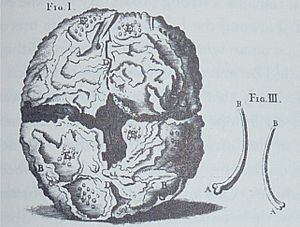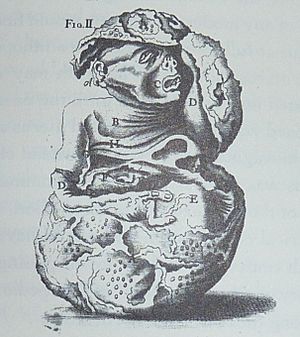Johann Georg Steigerthal facts for kids
Johann Georg Steigerthal was an important German doctor and writer who lived from 1666 to 1740. He was born in Nienburg. He became a special doctor for kings and queens, known as a court physician.
Contents
Johann Georg Steigerthal: A Doctor's Life
Early Life and Education
Johann Georg Steigerthal was born in Nienburg, Germany, in 1666. His father, also named Johann Georg Steigerthal, was a city preacher. Young Johann Georg decided to study medicine. He went to several famous universities. He studied at the University of Helmstedt starting in 1684. Later, he continued his studies at the University of Leiden in 1688 and Utrecht University in 1689. He finished his medical degree in 1690.
Becoming a Royal Doctor
In 1703, Steigerthal became a professor of medicine at the University of Helmstedt. His work was recognized internationally. In 1714, he was chosen to be a member of the Royal Society of London. This was a very important scientific group. The same year, the ruler of Hanover became King George I of Great Britain. In 1715, Steigerthal was appointed as the personal doctor for King George I in Hanover. This meant he was a trusted physician to the king.
Important Discoveries and Contributions
Steigerthal was involved in several interesting medical and scientific events. In 1720, he wrote the first description of a very rare medical case. This was about a "lithopedion" found in Anna Mullern at Leinzell. A lithopedion is a rare condition where a fetus dies and becomes calcified, turning into a stone-like mass.
In 1723, a famous scientist named Hans Sloane asked Steigerthal for help. Sloane was the President of the Royal Society. He sent Steigerthal to Lemgo to buy a large collection of items from East Asia. This collection belonged to a traveler named Engelbert Kaempfer. These items, along with Sloane's own collection, later became part of the very first collections of the British Museum.
Steigerthal also made a discovery related to natural resources. In 1730, he found a petroleum well in Linden, which is now part of Hanover. A street in Hanover was named after him in 1927 to honor this discovery. In 1732, Steigerthal helped with one of the first successful vaccination programs in England. This was a big step in preventing diseases. He was also appointed to the 'Hofrat' or privy council of Hanover, which was an important advisory group.
 | Ernest Everett Just |
 | Mary Jackson |
 | Emmett Chappelle |
 | Marie Maynard Daly |



